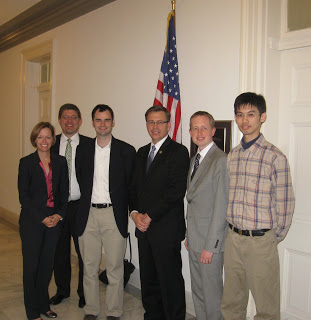By James Van Howe
 From Left: Laura Kolton (OSA Public Policy Team), Greg Quarles (President of B.E. Meyers Electro Optics), James van Howe (Assistant Professor, Augustana College), Representative Bobby Schilling (IL), Adam Zysk (research associate IIT, Chicago), Hong-Jhang Syu (Research Assistant, National Taiwan University)
From Left: Laura Kolton (OSA Public Policy Team), Greg Quarles (President of B.E. Meyers Electro Optics), James van Howe (Assistant Professor, Augustana College), Representative Bobby Schilling (IL), Adam Zysk (research associate IIT, Chicago), Hong-Jhang Syu (Research Assistant, National Taiwan University)
This post originally appeared on Jim’s cleo Blog and is reproduced with permission from the author.
On Thursday May 5th, a number of the conference attendees took a bus to Washington D.C. to visit the offices of various members of congress and senators of our respective legislative districts and states. Our goal was to help defend science funding levels in the wake of strong national sentiment to reduce U.S. federal spending.
What we learned the night before in the briefing at the Baltimore Convention Center was fascinating, and the actual day of visiting policy-makers to discuss science-funding issues was exhilarating. In the briefing, we learned that one of most effective ways of influencing a senator or member of congress was through a conversation with a constituent. Visits from lobbyists actually rank much lower on survey data from congressional staffers. What was also fascinating to me was that an email from a constituent ranked just below a visit from a constituent and still far above a visit from a lobbyist. I immediately promised myself to regularly send email to my representatives and you should too! It works!
At the briefing, one of the speakers, Mike Lubell, the Public Affairs Director at the American Physical Society, showed us revealing survey data from focus groups. One group was from a community with many ties to science industry and one had very little. Shockingly, the results were the roughly the same for each:
1. The groups generally loved science and are supportive of science research
2. The groups thought that science should be a national priority
3. Here’s the kicker: The the groups were distrusting of the federal government as the funding source for science research. Somehow they want to keep good science without federal funding.
So there is good and bad news. Scientist can expect good moral and emotional support from the public, but maybe not dollars. In fact, Lubell showed a list that had science as the second most chosen category from the groups of where to cut federal funding…for the full post click here.
Find more info on the Capitol Hill day event here.
Posted: 12 May 2011 by
James Van Howe
| with 0 comments